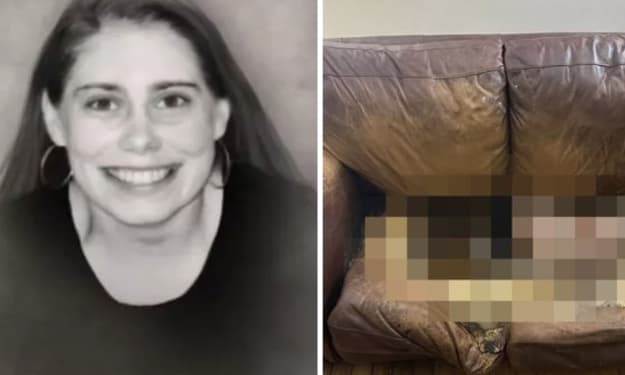
Why do individuals confess to the police when making a plea bargain in court could potentially reduce their punishment? Confessing to the police might seem counterintuitive, as it can only harm your case. However, this phenomenon is quite common. Take, for instance, the confession of a crime involving the killings of Bridget Harrison and Caleb Harrison. The question arises: are these confessions genuine admissions of guilt or instances of wrongful accusations?
The process begins with an officer adopting an ally-like stance during an interrogation. Before delving into the details of the case, they often establish rapport through gestures like offering a drink or finding common ground with you. This strategy aims to make you feel at ease and unthreatened.
You'd hardly suspect that the detective already possesses concrete evidence pointing to the person in front of him as the perpetrator of a crime. "I'm a big coffee guy. I don't know if you're a coffee guy or something. I didn't want to drink in front of you, so no, I appreciate that. All right, go ahead, Russell." The detective clarifies that you're not under arrest, emphasizing your freedom to leave anytime you wish. The door remains unlocked, and Teresa is ready to accompany you to the lobby.
Once rapport is established, the next phase is what the police term a "positive confrontation." During this stage, they assert that they are already aware of your guilt and simply seek an understanding of your motives. Whether this assertion holds true or not, interrogators will convey absolute certainty about having an abundance of evidence, casting doubt on your innocence. This can involve misleading you with fabricated witnesses, fingerprints, DNA, or video footage.
Subsequently, an officer attempts to extract a confession from an innocent individual. Note the confusion and uncertainty that creep in when the innocent person is confronted with false evidence. "There's a number, the number of witnesses. Great, one of them had a video camera. Perfect, yeah, yeah. So view the video camera I have." This tactic can be incredibly effective in eliciting confessions from both the guilty and the innocent.
Regrettably, while these tactics may work well on guilty individuals, they can also lead innocent people to confess. A poignant example is Marty Tancleff, who, at the age of 17, awoke to find his mother stabbed to death and his father injured and unconscious. After hours of interrogation without success, an officer falsely informed Marty that his father had regained consciousness and identified him as the attacker. In a state of shock and not realizing that the police could lie during interrogations, Marty began to doubt himself and eventually provided a false confession. He later recanted, attributing it to coercion. This false confession resulted in his conviction, and he spent 17 years in prison before being exonerated.
The effectiveness of positive confrontations stems from the unwavering certainty with which the police present their evidence. For example, police are questioning a coworker who claimed not to have seen a missing woman on the day of her disappearance. The officer's tone leaves no room for doubt regarding the presence of the missing woman in the coworker's car. "Okay, well, tell us when you left with her in the car because that is what is shown. We can't make up that we can't falsify video camera... Lee, I'm not lying to you because you know I'm telling the truth because you know that's what's on the video."
In this case, the video camera was real, but they had no concrete evidence that the missing woman had entered his car; it merely resembled his vehicle. Yet, due to the detective's unwavering conviction, the suspect confessed to lying and ultimately confessed to murdering the missing woman.
Following the confrontation with evidence, which may be the first time you realize you are a serious suspect, it is common for individuals to deny their guilt. At this point, police interrogators employ a tactic known as "pattern interrupt," where they shut down denials before they can even be expressed, preventing you from gaining confidence in your ability to assert your innocence. In one example, as soon as the person attempts to deny harming their missing family, the officer abruptly cuts them off: "I don't know how much I could tell you right now, like I did not—it's not even—it's not an option right now because you did not pass the polygraph, so I know you were being deceptive. So that's not even an issue right now. The issue right now is what happened to Shanann, Bella, and Celeste."
As you begin to feel trapped, worn down, and hopeless, the next step is to provide you with an escape route through minimization. The objective here is to coax a confession by downplaying the perceived severity of the crime. One common approach is to suggest that you did what anyone else would have done in your situation. This is illustrated by how this approach alone can elicit a confession. In a sexual assault case, a conversation was initiated with the suspect about the victim's attractiveness. The cop empathized with his perspective, and this connection led to him opening up. He's currently incarcerated.
Another technique involves making you believe there's room to shape the narrative that goes public. Surprisingly, the questions you're about to encounter were what ultimately persuaded a man to confess to murder. Manipulating public perception and your image play a significant role. Do you want people to remember you as someone who made amends, or as a heartless individual who won't disclose critical information about the victim's whereabouts?
During this minimization process, police often employ alternative questions, presenting a scenario where you're guilty but in a more sympathetic or justifiable manner. For instance, in the case of Chris Watts, whose wife and daughters were missing, they initially downplayed the crime as a mistake and then posed an alternative question, making it easier for him to confess without being seen as entirely responsible.
However, it's worth noting that minimizing a crime during an interrogation isn't just effective for getting the guilty to confess; it can also lead innocent people to falsely admit wrongdoing.
The tactics mentioned here are part of a broader psychological strategy used by police during interrogations. The goal is to create a situation where you feel trapped, doubt yourself, and ultimately see confessing as your way out of a difficult situation. It's a powerful but potentially dangerous process, and it's crucial to understand your rights and consider seeking legal counsel if you ever find yourself in such a situation.
Remember, your right to remain silent and consult an attorney is essential to protect your legal interests.
About the Creator
Enjoyed the story? Support the Creator.
Subscribe for free to receive all their stories in your feed. You could also pledge your support or give them a one-off tip, letting them know you appreciate their work.





Comments
There are no comments for this story
Be the first to respond and start the conversation.